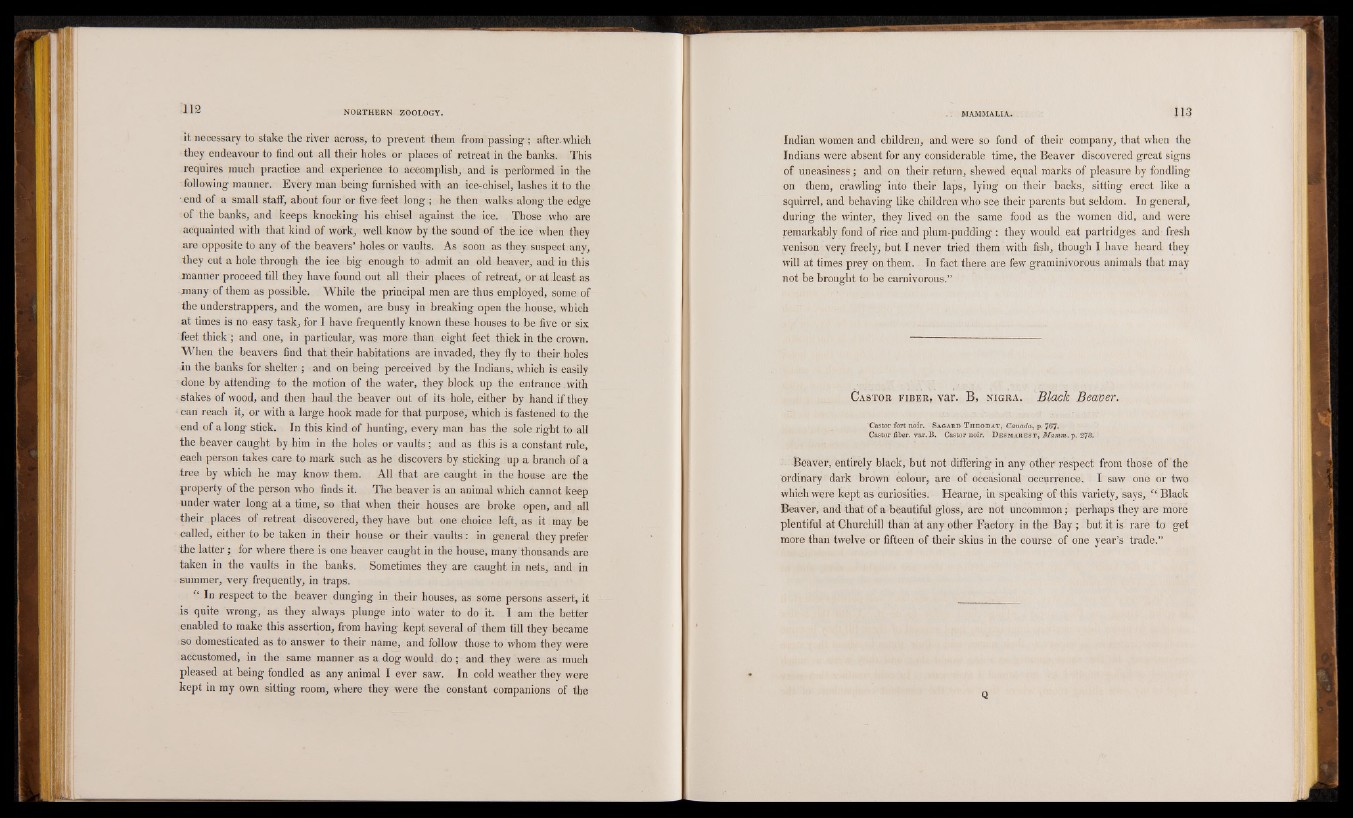
it necessary to stake the river across, to prevent them from passing; after, which
they endeavour to find out all their holes or places of retreat in the banks. This
requires much practice and experience to accomplish, and is performed in the
following manner. Every man being furnished with an ice-chisel, lashes it to the
end of a small staff, about four or five.feet long.; he then walks along the edge
of the banks, and keeps knocking his chisel against the ice. Those who are
acquainted with that kind of work, well know by the sound of the ice when they
are opposite to any of the beavers’ holes or vaults. As soon as they suspect any,
they cut a hole through the ice big enough to admit an old beaver, and in this
manner proceed till they have found out all their places of retreat, or at least as
many of them as possible. While the principal men are thus employed, some of
the understrappers, and the women, are busy in breaking open the house, which
at times is no easy task, for I have frequently known these houses to be five or six
feet thick; and one, in particular, was more than eight feet thick in the crown.
When the beavers find that their habitations are invaded, they fly to their holes
in the banks for shelter ; and on being perceived by the Indians, which is easily
done by attending to the motion of the water, they block up the entrance with
stakes of wood, and then haul the beaver out of its hole, either by hand if they
- can reach it, or with a large hook made for that purpose, which is fastened to the
end of a long stick. In this kind of hunting, every man has the sole right to all
the beaver caught by him in the holes or vaults; and as this is a constant rule,
each person takes care to mark such as he discovers by sticking up a branch of a
tree by which he may know them. All that are caught in the house are the
property of the person who finds it. The beaver is an animal which cannot keep
under water long at a time, so that when their houses are broke open, and all
their places Of retreat discovered, they have but one choice left, as it may be
called, either to be taken in their house or their vaults: in general they prefer
the latter; for where there is one beaver caught in the house, many thousands are
taken in the vaults in the banks. Sometimes they are caught in nets, and in
summer, very frequently, in traps.
“ In respect to the beaver dunging in their houses, as some persons assert, it
is quite wrong, as they always plunge into water to do it. I am the better
enabled to make this assertion, from having kept several of them till they became
so domesticated as to answer to their name, and follow those to whom they were
accustomed, in the same manner as a dog would do ; and they were as much
pleased at being fondled as any animal I ever saw. In cold weather they were
kept in my own sitting room, where they were thé constant companions of the
Indian women and children, and were so fond of their company, that when the
Indians were absent for any considerable time, the Beaver discovered great signs
of uneasiness; and on their return, shewed equal marks of pleasure by fondling
on them, crawling into their laps, lying on their backs, sitting erect like a
squirrel, and behaving like children who see their parents but seldom. In general,
during the winter, they lived on the same food as the women did, and were
remarkably fond of rice and plum-pudding : they would eat partridges and fresh
venison very freely, but I never tried them with fish, though I have heard they
will at times prey on them. In fact there are few graminivorous animals that may
not be brought to be carnivorous.”
C a s t o r f i b e r , var. B, n ig r a . Black Beaver.
'Castor fort noir. Sagaud T heodat, Canada, p. 767.
Castor fiber. var.B. Castor noir. D e s m a r e s t , Mamm. p . 278.
Beaver, entirely black, but not differing in any other respect from those of the
ordinary dark brown colour, are of occasional occurrence. I saw one or two
which were kept as curiosities. Hearne, in speaking of this variety, says, “ Black
Beaver, and that of a beautiful gloss, are not uncommon; perhaps they are more
plentiful at Churchill than at any other Factory in the Bay ; but it is rare to get
more than twelve or fifteen of their skins in the course of one year’s trade.”
Q